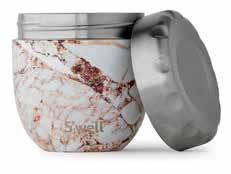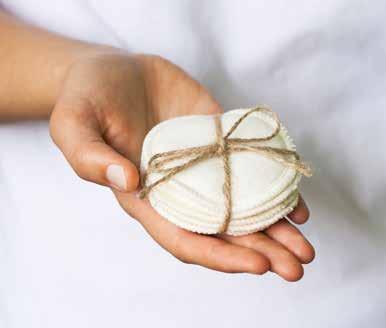
6 minute read
happy at home
REDUCING YOUR WASTE AND CREATING A HEALTHIER ENVIRONMENT
Zero waste, sustainable, eco-friendly—there is a good chance you have heard at least one of these terms, but might not know exactly what they mean, or how to go about incorporating these concepts into your life. As people become increasingly aware of where their trash ends up, there has been a push toward a more mindful way of consuming and utilizing products that emphasize reusable items. For some, they take a more extreme approach, striving to create no trash at all; hence the term zero waste. While that is a fantastic goal, for many it is simply not attainable, and it is easy to feel overwhelmed by the idea of cutting all single-use products out of one’s routine. Even if being completely waste-free sounds daunting, there are some beneficial steps you can take to cut down on your personal waste and create a home that is more sustainable and ultimately healthier for you and your family. Here are some tips to help you as you either start a zero waste journey or simply apply some of the principles to lessen your trash output.
START WITH A PLAN Focus on the five R’s, created by Bea Johnson who is credited with raising awareness of zero waste practices thanks to her book, Zero Waste Home. First, Refuse what you don’t need. Reduce what you do need. Reuse the items you can. Recycle what you can’t refuse, reduce, or reuse. Rot (compost) the rest. These are great principles to keep in mind as you begin to create a more sustainable home.
BEE’S WRAP A beeswax wrap is a food-safe wrap material consisting of a coated fabric infused with beeswax, organic jojoba oil, and tree resin. Bee’s Wrap is washable, reusable and compostable.

STASHER Made from pure platinum silicone, these food storage bags are endlessly reusable. Both dishwasher and microwave safe, Stasher makes choosing sustainability easy as you eliminate single-use plastics from your food storage routine.

S’well Eats™ can now help you fuel all your food needs through its new lunch container and food storage options. Simply make your meal, nest your containers, and go. S’WELL


REUSABLE CONTAINERS Your kitchen is a huge source of waste in your home. From all the packaging that comes from your grocery purchases, to the waste you make when you store food, there are many ways to eliminate some trash from your kitchen. A great first step is to take a look at the products you buy. For example, oranges and avocados can come grouped in a plastic mesh bag or can be sold as separate, loose items in the produce section. Consider buying the unpackaged products and bringing your own reusable grocery bags. Taking a look at the packaging can also help you decide what to purchase for your personal health. Most processed foods come in some kind of plastic, paper, or metal packaging while fresh, whole foods have natural skins or shells that can be composted. Meat can also be purchased in recyclable paper which helps cut down on waste.
Once home, reaching for the plastic wrap or grabbing a freezer bag might be your go-to when you store food, but there are alternatives available. Glass or BPA-free plastic storage containers now come in all sizes, and can be reused for years. There are also reusable storage bags that can replace the wasteful single-use plastic bags. Take a look at a few ideas to the left. Also, think about potential storage items you may already have in your home. For example, mason jars can act as drinking glasses, or store pantry items such as rice and flour.
While the idea of composting might seem a little daunting, there are products and local services that will make it easier if you want to reduce your food waste. For the more adventurous composter, there are in-home worm bins that will turn your food scraps into healthy soil that can be used for potting plants or a small backyard garden. For something less involved, kitchen composting bins are now compact, and there are even services like Naples Compost who will pick up your food waste then return composted soil.
WATER WASTE If you are using bottled water, think about switching to a filtration system. This will cut down on hundreds of bottles a year. Since much of the bottled water on the shelves is just repurposed municipal water stored in plastic bottles that can leach harmful chemicals,

you can have greater control over what you put into your body. One of the best water filters on the market comes from Berkey. Their Big Berkey comes with fluoride and arsenic filters, and the famous Black Berkey purification elements are certified by State and EPA accredited laboratories.
BATHRO OM ROUTINE Your bathroom is another place where waste is produced through paper products and plastic containers. While most of us aren’t hardcore enough to switch to reusable toilet paper, there are easier and more convenient steps you can take. First, consider switching to a hand soap that comes in recyclable cardboard cartons and refilling a decorative glass or porcelain dispenser. You can also create an oral hygiene routine that is eco-friendly by using toothpaste tabs which eliminate the toothpaste tube, or try compostable bamboo toothbrushes.
For your face, consider ditching those disposable makeup wipes or cotton rounds for reusable cloth or silicone alternatives. There are plenty on the market and they allow you to choose a makeup remover or face wash based on your skin’s needs, so they can be a great alternative to the pre-treated wipes found in the store.
Think about swapping out your body wash with soap bars. These


bars come wrapped in compostable or recyclable paper or are produced in bulk and then cut into individual bars. Often, these are sold without any kind of packaging. There are also shampoo and conditioner bars that eliminate the plastic container and popular brands are getting on board so you don’t have to search high and low anymore.
In general, there are many simple steps you can take to make your home a more sustainable place. Cleaning products can be replaced with natural alternatives from simple vinegar which can be bought in a glass bottle, to products you can buy that are natural and packaged in reusable containers. Take note of your clothing purchases as well. Creating a more cohesive wardrobe and then cleaning or repairing your clothes instead of throwing them out are ways to stretch the life of your clothing. Once you are done with an item either donate it or repurpose it, for example, into reusable shopping bags. You can even get your pets involved in a more sustainable life. Choose toys made from natural elements and fibers, make their food from scratch (a healthy alternative to the processed food many pets eat), use eco-friendly pet waste bags, and give them treats bought from bulk containers at your local pet store instead of small plastic bags.
Whether you go 100% zero waste or simply apply a few of these ideas to your everyday routine, here’s to creating a happy, healthy home for you and the planet.










